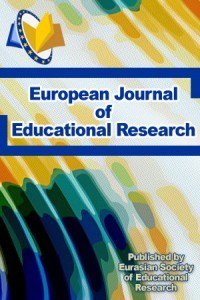Effect of Feedback Strategy and Motivation of Achievement to Improving Learning Results Concept in Learning Civic Education in Vocational High School
Effect of Feedback Strategy and Motivation of Achievement to Improving Learning Results Concept in Learning Civic Education in Vocational High School
___
- Anderson, L.W., Krathwohl, D.R. (2001). A Taxonomy for Learning, Teaching, and Assessing. New York: Logman.
- Andrew.C. (2008). Correcting a Metacognitive Error: Feedback Increases Retention of Low Confidence Correct Responses. Journal of Experimental Psychology, 34 (4), 918-928. Retrieved from: https://www.google.co.id/?gws
- Arends, R.L. (2008). Learning To teach. Seventh Edition. New York: McGraw Hill Companis Inc.
- Atmadi, A., & Setyaningsih, Y. (2004). Educational Transformation Entering the Third Millennium. Yogyakarta: Kanisius Publisher Sanata Dharma University.
- Birgit Harks. (2014). The effects of feedback on achievement, interest and self-evaluation: the role of feedback's perceived usefulness. Educational Psychology, 34(3), 269-290. Retrieved from: https://www.google.co.id/?gws
- Butler, R. (1987). Effects of different feedback conditions on motivational perceptions, interests, and performance. Journal of Educational Psychology, 79(4), 474-482. Retrieved from: https://www.google.co.id/?gws
- Butler, Andrew C, et al. (2007). The Multiple-Choice Tests, Journal of Experimental Psychology, 13(4), 273-281. Retrieved from: https://www.google.co.id/?gws
- Brookart, Susan, M. (2006). How to give effective feedback to your students. Alexandra Virginia USA: Association for supervision and Curriculum Development (ASCD).
- Christine, Harris. (2003). Social Decission Making Skills, Probe Research. Retrieved from: https://www.google.com/search?q=Christine
- David, D. Vaus. (2002). Analyzing Social Science Data: 50 Key Problems in Data Analysis, Thousand Oaks: Sage Publications, 31(9).
- Degeng, Nyoman, S. (2013). Learning Sciences. Bandung: Kalam Hidup
- Gagne, R.M. (1985). The Conditions of Learning. Fourth edition. New York: CBS College Publishing.
- Gopal Patil, S.S. (2015). Effectifeness of Juriprudential Inquiry Model of Teachhing on The Academic Achievement of Social Science Among secondary. School Student. International Multideciplinary Research Journal, 4(12), 1-5. Retrieved from: https: //www.google.com//gws
- Huda, M. (2014). Teaching and Learning Models. Yogyakarta: Student Literature.
- Joyce. B & Weil. M. (2003). Models of Teaching. Fith Edition.New Delhi: Prentice-Hall of India.
- Hatie, J. & Helen Timperley. (2007). The Power of Feedback. Review of Educational Research, 77(1), 81-112. Retrieved from https://www.google.com/education
- Haiti, J. & Mark Gan. (2011). Intruction Based on Feedback, Hanbook Research on Learning and Instrauction, Chapter 13, 249-270.
- Hailikari, Telle. (2009). Assessing University Students' Prior Knowledge Implications for Theory and Practice. University of Helsinki Deparement of Education. Research Report, 227(6). Retrieved from: https://helda.helsinki.fi/bitstream
- James J. Burkitt. (2013). The Impact of Prior Knowledge about Visual Feedback on Motor Performance and Learning. Advancesin Physical Education, 3(1), 1-9. Retrieved from http://www.scirp.org/journal/
- Jared A chase, Ramona Houmanfaas. (2009). The Differential Effects of Elaborative Feedback and Basic Feedback on Student Performance in a Modified, Perzonalized System of Instruction Course. Journal of Behavior Education, 18, 245-265. Retrieved from www.unr.edu/psych/behavior
- Jiirgen Wilbert, Michael Grosche, Heike Gerdes. (2015). Effects of Evaluative Feedback on Rate of Leraning and Taks Motivation: An Analogue Experiment. A Comtemporary Journal, 8(2), 43-52. Retrieved from: www.ldworldwide.org/pdf/LDCJ
- Kulik, J. A., & Kulik, C. C. (1988). Timing of feedback and verbal learning. Review of Educational Research, 58, (1), 79-97. Retrieved from: www.epsteineducation.com/home
- Marguerite G. Lodico., Dean T., Spaulding, Katherine H. Voegtle. (2006). Methods in Educational Research: From Theory to Practice. San Francisco: John Wiley & Sons.
- Marieke Thurlings, at.all. (2013). Understanding feedback: A learning theory perspective. Journal homepage: Computers & Education 9, 1-15. Retrieved from www.sciencedirect.com/science
- Eggen, P. & Kauchak, D. (2012). Strategies and Models for Teachers: Teaching Content and Thinking Skills. Six Edition. Boston: Pearson Education.Inc.
- Erwin, M. (2011). Education Citizenship of the Republic of Indonesia. Bandung: PT. Refika Aditama.
- Marzano, R.J, Pickering, D.J & Pollock, J.E. (2004) .Classroom Instruction that Works: Reseacrh-Based Strategies For Increasing Student Achievement. Chapter 8, 92.
- Moreno, R. (2004). Effects of explanatory versus corrective feedback in discovery-based multimedia. Instructional Science, 32, 99-113. Retrieved fromhttps://books.google.com/books
- Mory, E. Holland. (2011). Feedback Research Rivisited. Handbook of Research for Educational Communication and Technology, AECT, 29, 919-956. Retrieved from www.aect.org/edtech/ed1
- Narciss, Susanne. (2010). Feedback Strategies for Interactive Learning Tasks. Handbook of Research for Educational Communication and Technology, Chapter 11.126-140. Retrieved from: www.aect.org/edtech/ed1
- Nwafor, C. E. (2014). Use of Jurisprudential Innovative Approach in teaching Basic Science: An alternative to Lecture Methode. International researchers, 3(1), 62-67. Retrieved from: http://iresearcher.org/Current
- Paul, C. Burnett. (2010). Praise and Feedback in Primary Classroom: Teachers 'and Student' Perspektives. Australian Journal of Educational, 10, 145-154. Retrieved from: https://www.google.co.id/?gws
- Santoso, S. (2014). Parametric Statistics: SPSS concepts and applications. Jakarta: PT. Elex Media Komputindo.
- Setyosari, P. (2013). Education and Development research strategy. Jakarta: Kencana Prenadamedia Group.
- Sichinga, K.T. (2014). Factors Influencing Quality of Feedback in Teaching in Botswana Senior Secondary Schools. International Journal of Research in Social Sciences, 4(1), 26-37. Retrieved from: www.ijsk.org/uploads/3/1/1/7/3117743/3
- Perry Roy Hilton and Charlotte Brownlow. (2004). SPSS Explained, East Sussex: Routledge, 364.
- Sugiyono, (2014). Statistics for Research. Bandung: Alfabeta.
- Shute, Valerie. J. (2008). Focus on Formative Feedback. Review of Educational Research, 78, (1), 153-159. Retrieved from: https://www.ets.org/Media/Research
- Travers, J. R., & Light, R. J. (1982). Learning from experience: Evaluating early childhood demonstration programs. Washington, oc: National Academy Press.
- Veer Pal, Singh. (2010). Effectiveness of Jurisprudential Inquiry Model of Teaching on Value Inclination of School Students, Journal of Educational Research, 47(2), 45-71. Retrieved from: https://www.google.com/search
- Voerman, L. at.al. (2012). Types and frequencies of feedback interventions in classroom interaction in secondary education. Journal hompage: Teaching an Teacher education, 30, 1-9. Retrieved from https://www.google.com/search
- ISSN: 2165-8714
- Başlangıç: 2012
- Yayıncı: Eurasian Society of Educational Research
Guadalupe Elizabeth MORALES-MARTİNEZ, Ernesto Octavio LOPEZ-RAMİREZ, Claudia CASTRO-CAMPOS, Maria Guadalupe VİLLARREAL-TREVİNO, Claudia Jaquelina GONZALES-TRUJİLLO
Silke RUPPRECHT, Peter PAULUS, Harald WALACH
Evaluation of Prospective Teachers in Terms Of Academic Self-Efficacy and Professional Competence
Mahire ASLAN, Asli Agiroglu BAKİR
M. Sait DİNC, Zubeyde KOCYİGİT
Maria Guadalupe VİLLARREAL-TREVİÑO, Ricardo Jesus VİLLARREAL-LOZANO, Guadalupe Elizabeth MORALES-MARTİNEZ, Ernesto Octavio LOPEZ-RAMİREZ, Norma Esthela FLORES-MORENO
Mehmet Koray SERİN, Semahat INCİKABİ
- SUMARNO, Punaji SETYOSARİ, - HARYONO
Measuring Literary Reading Motivation: Questionnaires Design and Pilot Testing
